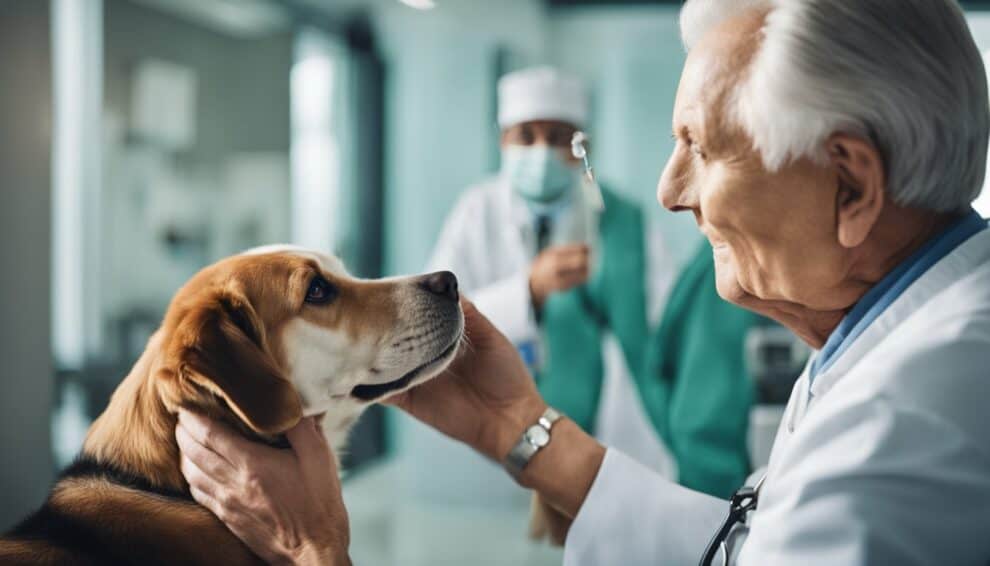As dogs age, their bodies undergo various changes, and their eyes are no exception.
The vision of senior dogs can be affected by conditions unique to their life stage, making them more susceptible to eye infections.
Staying on top of eye health is essential for maintaining the overall well-being of older dogs.
Simple yet effective practices can help prevent eye infections, ensuring these beloved pets continue to enjoy a good quality of life.

Regular veterinary check-ups are key in catching eye issues before they become problematic.
Because senior dogs are more likely to develop eye infections and other ocular conditions, a proactive approach to eye care is crucial.
Cleanliness around the eye area, along with careful monitoring for any signs of irritation or abnormal discharge, can go a long way in bolstering eye health.
Understanding the signs of eye infections is equally important in preventive care.
Dog owners should be aware of symptoms like excessive tearing or changes in the eye’s appearance.
This knowledge coupled with prompt veterinary intervention can halt the progression of infections and keep a senior dog’s eyes as healthy as possible.
Understanding Dog Eye Infections

Eye infections in senior dogs can lead to discomfort and, if untreated, may cause more serious health issues.
This section will provide an understanding of the different types of eye infections, how to recognize their symptoms, and the importance of professional veterinary care.
Common Types and Causes
Bacterial infections in dogs’ eyes, such as conjunctivitis, are often caused by Staphylococci or Streptococci.
Viral infections can be due to the canine distemper virus or canine herpesvirus, and fungal infections, though less common, can still pose a threat to a dog’s ocular health.
Allergies and foreign objects in the eye also frequently lead to infections.
Conditions such as corneal ulcers, uveitis, or glaucoma can often have infectious components.
Recognizing the Symptoms
Owners should look for signs like:
- Redness and inflammation of the eye
- Discharge, which could be clear or purulent
- Pain or discomfort, evidenced by pawing at the eye
- Swelling around the eye area
- Frequent squinting, blinking, or keeping the eye closed
These symptoms might suggest an underlying infection warranting prompt attention.
Diagnosis and Veterinary Care
A veterinarian will perform a thorough examination including a detailed history, and may conduct tests such as the fluorescein stain to check for corneal abrasions, or the schirmer tear test to measure tear production.
Accurate diagnosis leads to optimal treatment, whether the infection is bacterial, viral, or fungal.
Prompt and appropriate treatment under veterinary guidance can mitigate discomfort and prevent complications, helping to maintain the senior dog’s ocular health and overall well-being.
Active Prevention and Daily Care

Senior dogs require attentive care to prevent eye infections.
This includes adhering to good hygiene practices and prioritizing their overall health through regular veterinary check-ups and a nutritious diet.
Maintaining Hygiene and Cleanliness
Proper grooming is fundamental in preventing eye infections.
A dog’s face should be gently cleaned with a damp cloth, paying close attention to the area around the eyes.
Owners should make sure to remove any debris or discharge that could lead to infections.
For breeds prone to excessive tear production or those with eyelid abnormalities, a veterinarian may recommend using a saline solution for routine eye cleaning.
Regular vaccinations and parasite control are also crucial as they protect against diseases that could potentially affect the eyes.
Additionally, dogs should have their eyes routinely checked by a veterinarian to monitor for issues that could exacerbate the risk of infections.
Diet and Health Monitoring
A senior dog’s diet can impact their overall health, including the health of their eyes.
Nutrients like vitamins A, C, and E can support eye health.
It’s essential to monitor for signs of systemic diseases such as hypothyroidism and diabetes, as these can affect eye health.
Senior dogs should be taken to the veterinarian for semiannual examinations to manage age-related changes proactively.
If any eye-related issues are noted, a veterinary ophthalmologist might become involved in the dog’s care.
This specialized care can help in the early detection and treatment of conditions that could lead to infections, ensuring that a dog’s twilight years are comfortable and healthy.
Treatment Options for Eye Infections

When it comes to treating eye infections in senior dogs, timely and appropriate therapy is critical.
The following treatment options focus on administering effective medications and implementing home care strategies to manage symptoms and facilitate recovery.
Medications and Therapies
Eye infections in dogs often require a combination of medications to relieve discomfort and combat the underlying cause.
Antibiotics are commonly prescribed for bacterial infections and come in the form of drops or ointments.
For infections with inflammatory components, a steroid may be added to the treatment regimen to reduce swelling and redness.
In cases where a fungal element is suspected, antifungal medications play an essential role.
It’s crucial to use these treatments under the guidance of a veterinarian, as misdiagnosis and inappropriate use can lead to more severe problems.
In situations where dryness is an issue, artificial tears can provide lubrication and comfort.
For more stubborn or resistant infections, there may be a need for systemic treatments like oral antibiotics, which can target broader issues within the body that may be contributing to the eye condition.
A veterinarian might recommend Vetericyn Plus Dog and Cat Eye Wash for gentle cleansing to remove irritants and help prevent further infection.
Home Care and Management
Management of eye infections at home should always complement the medical treatment and not replace it.
A standard home remedy is a gentle saline flush to cleanse the eye of debris.
However, it’s important to avoid any over-the-counter medications or concoctions without a vet’s approval.
Owners can use an E-collar or Elizabethan collar to prevent the pet from scratching or rubbing the eye and complicating the infection.
Regularly flushing the eye with the prescribed solutions can help clear the infection, and it is essential to always wash hands before and after treating the pet.
In some cases, home remedies may ease symptoms, but they should never be the sole treatment approach, especially in severe cases.
Monitoring the dog’s response to treatment and keeping a watchful eye for any changes in symptoms is critical for recovery.
Special Considerations for Senior Dogs

As dogs age, their bodies undergo various changes, and their eyes are no exception.
Senior dogs can face a range of eye-related issues that require careful monitoring and management.
Ensuring their visual health continues into their golden years means paying special attention to age-related eye changes and managing chronic conditions effectively.
Monitoring Age-Related Eye Changes
Regular veterinary check-ups can help detect common eye conditions in senior dogs, such as cataracts, which cause the lens to become cloudy and can lead to diminished vision.
Another condition to look out for is keratoconjunctivitis sicca, commonly known as dry eye, which can result in a painful inflammation of the cornea if left untreated.
It is crucial for caregivers to observe their senior dogs for signs of these age-related eye changes, which can include:
- Cloudiness or opacity in the eyes, indicating potential cataracts.
- A noticeable decrease in vision, such as bumping into objects or hesitant navigation.
Managing Chronic Conditions
Chronic eye conditions like dry eye and keratitis (an inflammation that can affect the cornea) need consistent treatment.
Veterinary care is essential to properly treat dog eye infections and manage any other chronic eye conditions that may arise.
The management of these conditions may include:
- Medications: To increase tear production in cases of dry eye or to handle infections.
- Surgery: In advanced cases, such as severe cataracts or to repair a corneal abrasion.
In cases like ulcerative keratitis, timely intervention is critical to preserve vision and maintain the health of the eye.
Proper management of these chronic conditions helps ensure that senior dogs maintain the best quality of life possible.
When to Seek Professional Help

Eye infections in senior dogs can range from mild irritations to serious conditions that may lead to blindness if not properly treated.
Knowing when to consult a veterinarian is crucial in protecting the eye health of your beloved dog.
One should consider the following signs as potential triggers to seek professional help:
- Persistent Symptoms: If symptoms like redness, swelling, or discharge persist for more than 24 hours, it’s time to consult a professional.
- Worsening Condition: An infection that seems to get worse rapidly, despite at-home care, warrants prompt veterinary attention.
- Vision Changes: Any signs of altered vision—bumping into objects or reluctance to jump or climb—suggest that a visit to a veterinary ophthalmologist may be necessary.
A veterinarian can provide an accurate diagnosis and recommend a recovery plan suited to the specific type of infection, whether it’s caused by bacteria, viruses, or trauma.
Early intervention is crucial, especially if the infection is contagious and poses a risk to other pets in the household.
Moreover, a veterinarian can assess if there has been any trauma to the eye that might require specialized care or even surgery.
In cases where a dog is squinting excessively, exhibiting signs of eye pain such as pawing at the eye, or when the eye looks cloudy, these are clear indicators of the need for immediate veterinary assistance.
Timely and appropriate treatment not only contributes to the dog’s comfort but also prevents complications such as chronic infections or potential blindness.
It’s always better to err on the side of caution and consult a professional when in doubt.
They are best equipped to treat dog eye infections effectively, ensuring the best possible outcome for your senior dog’s lasting health and vision.















